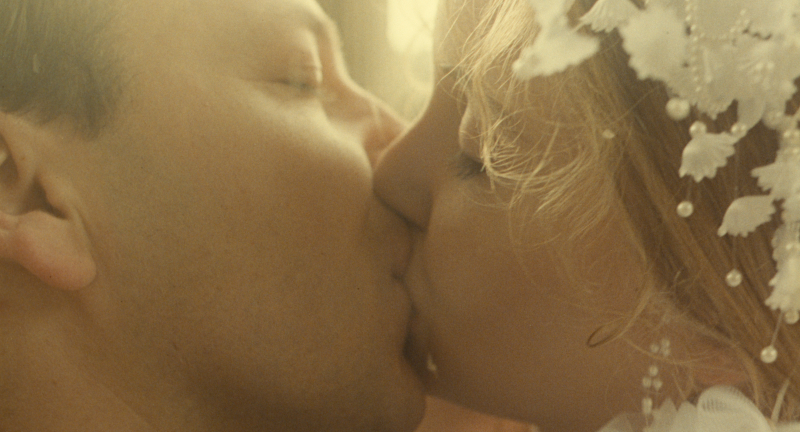Director – Krzysztof Kieślowski – 1994 – France – Cert. 15 – 92m
****
A Pole down on his luck and facing legal proceedings from his French wife, smuggles himself on a plane from Paris to Warsaw in order to get his life and dignity back – 4K restoration is out in UK cinemas on Friday, April 7th
This represents the second part of a trilogy based on the three colours of the French national flag, with each film representing one of that nation’s three values of liberté, égalité, fraternité (liberty, equality, brotherhood). Or perhaps it’s not as straightforward as that – at least, that’s what actress Julie Delpy suggested when I interviewed her about the film in 1994.
There are some curious editing decisions at the start – bits of stories told in fuller detail later on, such as shots of a suitcase on an airport conveyor belt, and a glimpse of a happy bride (Julie Delpy) in her white bridal dress leaving the church building for the fresh air and bright sunlight outside to meet waiting guests as, in front of her, a host of pigeons take off, an image to which the editing returns several times during what follows. Pigeons seem likewise to be scattered around the narrative.
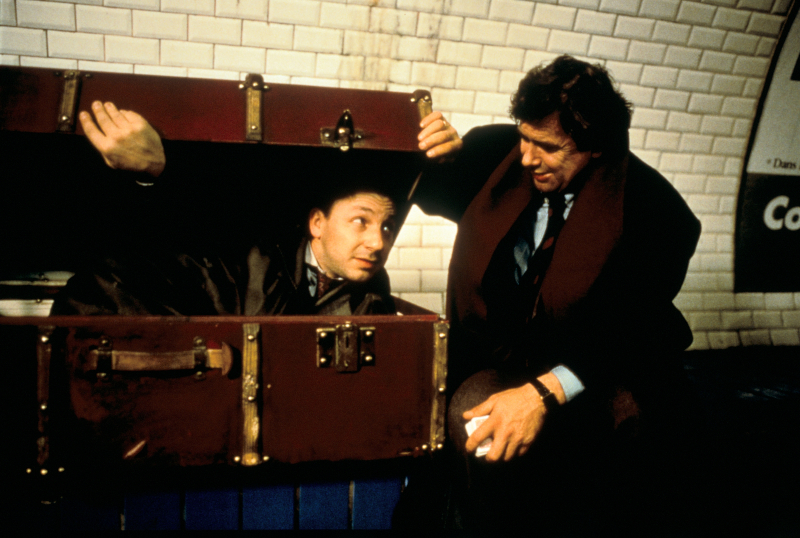
Back to the opening: shoes walk on a pavement briefly recalling the opening of Strangers On A Train (Alfred Hitchcock, 1951) and the walking the streets of Blackmail (Alfred Hitchcock, 1929) before our view pans upwards to reveal our protagonist, summonsed to a Parisian law court for a divorce hearing on the grounds of his having failed to consummate the marriage. Both husband Karol Karol (Zbigniew Zamachowski) and wife Dominique (Delpy) are questioned. He speaks only Polish, so requires an interpreter. He’s evasive as to intimate details, but it’s clear he still loves Dominique. She used to love him, but now wants out.
Somewhere in the middle of all this, Julie (Juliette Binoche) sticks her head through the door, apologises then vanishes. If you’ve seen the earlier Three Colours: Blue (Krzysztof Kieślowski, 1993) you’ll know what all that’s about.
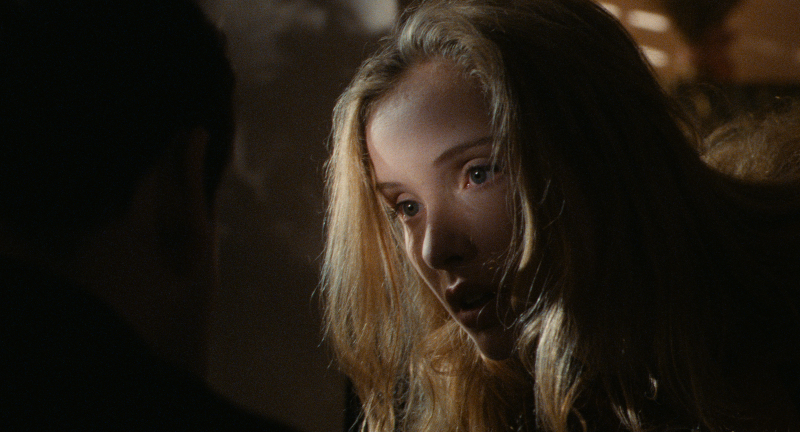
Karol goes to an ATM, which confiscates his card; inside the bank, the retrieved card is unhelpfully cut in half by a customer service person. With no money and in need of shelter, he uses a key to open the padlock to his hairdressing salon’s premises. Finding him there in the morning, she first teases him sexually then sets the net curtains on fire, so she can blame him and have every cop in Paris looking for him.
Sheltering in a subway tunnel, he meets fellow Pole Mikolaj (Janusz Gajos) who is shortly due to fly home to Warsaw. Karol persuades Mikaolaj to take him, Karol, hidden in his suitcase, as baggage on the flight. Alerted by the weight of the suitcase which indicates potential valuables therein, thieves pick up the case at Warsaw only to dump Karol on a rubbish tip when they discover him to be the contents.
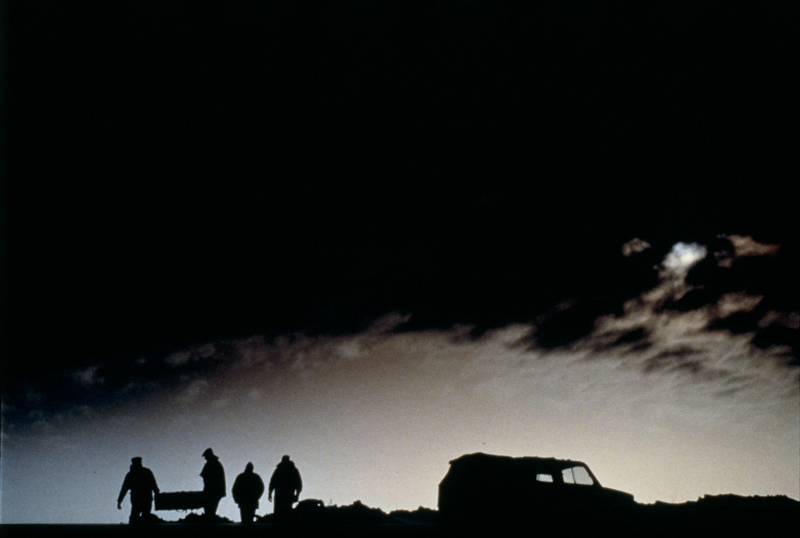
He gets away and hooks up with his brother Jurek (Jerzy Stuhr), doing hairdresser work at the latter’s salon. Following a lead from a customer, he becomes a bodyguard to a wheeler-dealer who he manages to beat to buy a valuable plot of land. He makes a killing, cutting in Mikolaj to his new company. As the money rolls in, he fakes his own death, inviting Dominique to the funeral (she now stands to inherit a considerable sum) so he can exact his revenge on her.
As played by Zamachowski, Karol Karol is a loveable rogue blessed with the ability to navigate his way out of impossible situations. Mikolaj is a good friend to him in his hour of need, while Jurek is also there for him. Dominique, on the other hand, treats him far less well. She leaves the court hearing in a taxi, unceremoniously dumping his sole suitcase on the street, He later phones her only for her to let him hear her enjoying sex with someone other than him. She seems manipulative, and it’s only once he’s left her orbit that Karol is able to turn his life around.
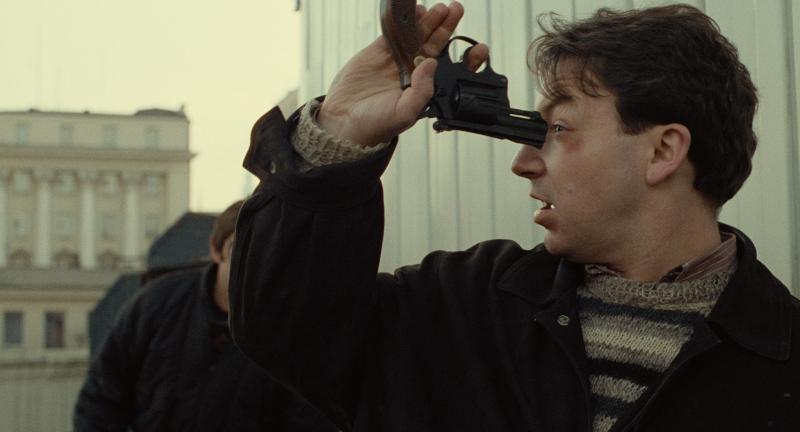
White is a very different film from its predecessor Blue. Where the bereaved and grieving Julie was melancholy, Karol Karol not only takes life as it comes but also constantly tries to make the best of it. In the end, his optimistic seizing of chances pays off, putting him in a secure enough position to exploit his ex and get his own back. Zamachowski’s comedic performance gives White a more lightweight, comedic and upbeat feeling than its predecessor. Where its protagonist Julie was perhaps a bit of a cold fish, Karol Karol is much warmer, wanting to seize the day.
In the end, we are all equal. What makes the difference is our approach to life: despite the crap Karol’s life constantly dumps on him (quite literally so – in the opening reel, his shoulder is hit by pigeon excrement as he makes his way to the court hearing), he keeps going, fuelled by a sense of optimism, a likeable character adrift in a fragmenting universe.
Three Colours: White is out in cinemas in the UK as a 4K restoration on Friday, April 7th.
Trailer (original):
Trailer (Criterion):
Trailer (Three Colours trilogy in 4K) Curzon (1m):
Trailer (Three Colours trilogy in 4K) Janus films (2m):
